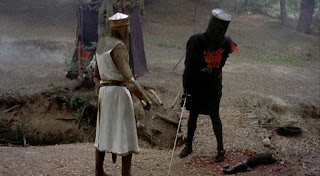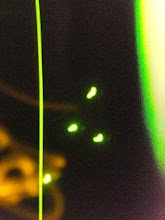 At the end of 2005's Batman Begins, Gary Oldman's character Commissioner Gordon gives a strange little speech that never quite made sense lo those many years ago: As Batman expresses optimism that Gotham will return to normal following the events of that film, Gordon responds: "Will it? What about escalation? We start carrying semiautomatics, they buy automatics. We start wearing kevlar, they buy armor-piercing rounds."
At the end of 2005's Batman Begins, Gary Oldman's character Commissioner Gordon gives a strange little speech that never quite made sense lo those many years ago: As Batman expresses optimism that Gotham will return to normal following the events of that film, Gordon responds: "Will it? What about escalation? We start carrying semiautomatics, they buy automatics. We start wearing kevlar, they buy armor-piercing rounds.""And," Gordon continues, "You're wearing a mask and jumping off rooftops".
Though the rest of Gordon's dialogue sets the stage more explicitly for a sequel, it's clear after watching the recently-released The Dark Knight that Gordon's speech was oddly prescient, as a single theme permeates the entirety of this film: escalation. If nothing else, The Dark Knight represents an escalation of nearly every aspect of the Batman saga. An escalation in stakes, certainly, but also an escalation in tension and good-old-fashioned fear. But first, a word: I can't imagine that I'll be including specific spoilers of any kind in this review, but you'll certainly hear about little scenes and vignettes from the film, and (hopefully) get a pretty general idea of how the movie works. Bottom line: I won't ruin the movie for you, but if you're wishing to retain your Dark Knight virginity you'd best stop here.
All right - stumbling out of the theater at 2:30 this morning, I struggled to gather my thoughts regarding what I had just seen. Usually when I exit a film, I have a pretty good idea of how I felt about it, but The Dark Knight left me so overwhelmed that I had trouble getting my brain back to square one. Most dramas and thrillers feature pretty clear ebbs and flows of action and emotion - tense scenes followed by comic relief followed by a few pacing scenes (followed, of course, by more tenseness). Knight shatters this pattern by including everything conceivably possible nearly all of the time. Comic relief? You've got it, but not before or after the traditional nailbiting intensity - right in the middle of it. Picture the coin flip scene from No County For Old Men on nitrous oxide and you'll have a pretty good idea of what to expect.
From the first shot to the credits reel, The Dark Knight is an unrelenting cavalcade of plot twists, violence, dark humor, brilliant performances and deft little touches. You'd hardly believe that you're watching the successor to Batman Begins - director Christopher Nolan has taken the essence of the first film, caffeinated it and set it loose upon an unsuspecting audience. While Batman Begins was a fantastic, believable superhero origin story with quiet spots and mystic elements, The Dark Knight is a 150-minute gritty crime drama, injected with funny brutality but no schadenfreude, filled with intense, creative action but no escapism. Prerelease hype aside, it's more De Niro than Daredevil, more Scorsese than Superman.
Most of this is on account of The Dark Knight's perplexing new villain: The Joker, played with manic, unhinged brilliance by Heath Ledger, a now-deceased great modern actor named after a candy bar. Heath's joker is far more dogmatic than previous Jokers we've seen - most of whom were more humorous, rational and human than the one you'll see in The Dark Knight. No, this Joker is after means-to-an end destruction. This self-proclaimed "agent of chaos" sets out to send a message to modern society: order and structure are a sham. This is his creed and it leaves little room for hesitation, rest or empathy.
And the Joker is set out to destroy any order, from the well-maintained loyalty system of the mob(s) to Gotham City's police system, right down to the new district attorney Harvey Dent, the new symbol of a cleaner Gotham. The fact that The Joker accomplishes so much chaos in two-and-a-half hours is as much a testament to the destructive nature of chaos as it is to the escalative nature of sequels (there's that word again). In the last film, the League of Shadows planned for decades and got thwarted at the starting gate, but here the Joker arrives in town with nothing but a couple of knives and a healthy supply of carefree sadism and manages to bring the whole city to its knees.
The Joker's big on murder, especially when it serves a purpose. He's perfectly willing to throw people into elaborate Saw-style decision-driven death traps, or just to shoot at oncoming cars for the sheer unadulterated glee of it. The Joker's plans for the city spread about five levels deep, then just one more in case everybody was getting a little too complacent. While the first film pushed itself forward to a logical conclusion, Knight makes a point of being unpredictable and liquifying things to a bloody pulp just when you thought the characters had achieved some minor victory. And the normal thematic devices aren't used in the way you'd expect: the Joker serves as much of the film's comic relief, while also serving as the reason why comic relief is needed in the first place. It's an odd feeling, watching the scariest, funniest villain that you've ever seen.
But, as said above, the Joker is more of a force than anything - his giddy worship of chaos and dissonance has no concrete end. "A plan?!" he bellows incredulously at one point (and here I'm writing from memory), "You think I have a plan!? I just do things. I'm not a schemer. I'm a dog chasing a car - I don't know what I'd do if I ever caught one." He shudders and shakes his head in horror - another brilliant Joker moment in a film full of brilliant Joker moments.
So while Batman Begins was very much Bruce Wayne's movie, it seems that The Dark Knight has been given to the Joker, and the entire film has inherited its attention to detail and affinity for anarchy from the purple-suited psycho. The Dark Knight is so supersatured with events that its two-and-a-half hour running time seems barely enough to contain it. In keeping with the spirit of the film everything else has changed, too: Batman's Gotham is seen far more often during the day, for example, yet appears somehow more drab and lifeless than ever. The movie is filled with action, but it's tense and paranoid. It's all thrilling, yes, but there are no "Whoo-hoo!" moments to sate the escapist expectations of audiences. This movie is more about character and rules than a fight between good and evil - The Joker has no rules, certainly, and his fight becomes a quest to get Batman to break the one rule he lives by. Break it he doesn't, but he gets close.
The film doesn't seem to resolve itself until you think about its final idea - that by not being a hero, Batman could turn out to be the greatest protector the city could ever hope for. I won't spoil anything, but the circumstances surrounding this theme are the only things that bring this film to anything approaching a satisfying emotional conclusion. It's something that Bruce Wayne had been considering the whole film, then was finally forced to achieve in a completely different way than he'd ever expected. It's the bittersweet Empire Strikes Back-style pseudo-resolution that leaves you wanting the third installment but changes things enough to give you something to look forward to.
This movie is as quotable, thought-provoking and well-shot as anything that you're likely to see this year, though a first viewing of the film may leave you feeling confused and unfulfilled, albeit exhilirated. A conversation earlier at the Wendy's with a stranger who had seen the movie earlier in the day (a nice guy from Ghana - he's not from around here or he would have been sulky and distrustful like everybody else) has brought me a bit closer to understanding my feelings regarding the entertainment value of the flick:
"I'm still not sure how I feel", he said. "I think I liked it, and I'm glad that I saw it, but I'm still not sure if I'll want to see it again."
So this film is a few things that Batman Begins wasn't - for one thing, it's a vehicle for bringing Tarantino levels of sadism and violence to a PG-13 audience [Thanks for the $$$, Warner Brothers! - MPAA]. It's an ambiguous exploration of personal borders, the vices and virtues of humanity. It makes you think, and forces you to find enjoyment in ways other than the typical superhero movie, even considering some of the outstanding releases this generation has seen. It's a movie that challenges its audience, rather than just delivering the expected standout fight scenes and nifty one-liners. It's pretty much everything that it needed to be, but not necessarily everything that you might have wanted it to be, and I think that I liked it, and I'm glad that I saw it, but. . . well, you see where I'm going here.
By the film's end, you'll be so drawn into the movie's hellish psychological nightmare that the sight of a fancy new Bat-gadget or Bat-backflip won't grip you, but the vicious internal turmoils and psychological mindgames might. Don't go in expecting Iron Man, or even something close. And if I haven't made it clear already. . . don't bring the kids to this one.
(NOTE: Academy Awards people - please give joint Oscars to Michael Caine, Morgan Freeman, Gary Oldman and Heath Ledger for their fantastic performances. I understand that you are all regular readers of this blog and thank you.)




Now that I think about it, you're right about TDK being Gordon's movie. I think they're gonna give him some difficult decisions for the third one. . .
ReplyDeleteAnother funny thing - I was apparently being a little Amerocentric when I wrote this. I wasn't even thinking of Heath Ledger as an American actor, necessarily, but just defaulted to "great American actor" when writing. I'll change it to "modern" or something.
Heath Ledger was named for the character Heathcliff in Wuthering Heights.
ReplyDeleteYeah. It was pretty much just a dumb joke (you know, the Heath bar. . .).
ReplyDelete